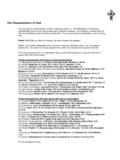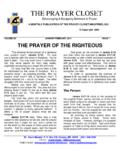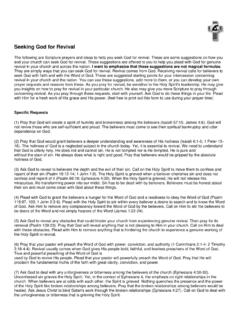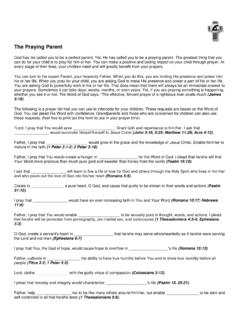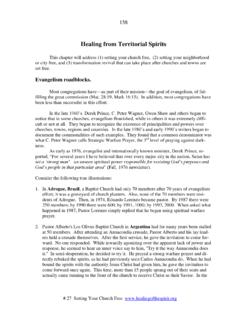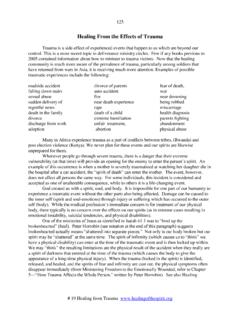Transcription of The Names of God - Prayer Closet Ministries
1 The Names of God In the Bible, a person's name is a description of his or her character. Likewise, the Names of God in Scripture are various descriptions of His character. These Names will give you powerful insights about His character. It will also provide you with a rich assortment of truths that you can use to praise and honor our glorious God. In this section, you are given the Names of God along with a basic description of that name . You are also given Scripture references where that name is used. This list of Scripture references is not exhaustive. This list is intended to help you get started learning His Names and using these truths to praise Him.
2 God "Elohim" The God of Absolute and Total Power Genesis 1:1, 2, 27, 28, 31; 9:6; Exodus 20:2; Numbers 27:16; Deuteronomy 23:5; Joshua 24:19; 1 Samuel 6:20; Psalm 7:9-11, 42:9, 47:7-9; 50:6, 77:13-14, 99:9; Ecclesiastes 12:13; Isaiah 37:16, 40:28, 41:13, 45:21, 46:9, 49:5, 52:10; Jeremiah 3:23, 32:27 In English translations, the word "God" is a translation of the Hebrew word "Elohim." This is the name for God as Creator. It reveals that God is the God of absolute power who has created everything. This name exalts the power of God. The God of the Bible is a God of power who can do all that He has purposed. God's power flows from His person accomplish all His purposes.
3 The Most High God "El Elyon" The Sovereign Ruler Genesis 14:18-20; Numbers 24:16; Deuteronomy 32:8; Psalm 9:2, 21:7, 47:2, 50:14, 56:2, 57:2, 87:5, 91:9, 78:35, 82:6, 83:18, 97:9; Isaiah 14:14; Daniel 4:17, 24-25, 32-35, 7:18, 22, 25, 27 In English translations, the English phrase "The Most High" or "The Most High God" is a translation of the Hebrew name "El Elyon." This name for God reveals that He is the sovereign ruler over all things. Since God has created all things, He can therefore control all things. Nothing is greater than God is. No one is greater than God is. Because of this, He rules over all things.
4 This name of God shows that nothing can stop or overcome God and His will. He works out all things according to His own will. God causes all things to work together for the good of His people. The GOD Who Sees "El Roi" The Ever-Seeing God Genesis 16:1-14 The phrase "The God who sees" is the English translation of the Hebrew "El Roi." This name of God teaches that He sees all and knows all. There is not one single thing that escapes His attention. He is the God who always sees. You can never escape His gaze for a single moment. This should convict you and comfort you. GOD Almighty "El Shaddai" The God of Sufficiency Genesis 17:1, 28:3, 35:11, 43:14, 48:3, 49:25; Job 11:7, 33:4, 34:10; Psalm 91:1 When you see the phrase "God Almighty" in an English translation, it is a translation of the Hebrew words "El Shaddai.
5 " This name of God exalts His sufficiency. God is able to bless and to bless beyond the asking and thinking of His people. God is sufficient to deal with every problem, task, or need. He can take a situation where there are no answers and no hope and do great and mighty things. Lord "Adonai" The Rightful Lord Genesis 18:14, 19:16, 20:4, 20:18; Leviticus 11:44, 19:2-4, 10, 12, 14, 16, 18, 32, 20:8, 26; Deuteronomy 5:9, 11, 6:15, 7:6-8; Psalm 37:33, 40:5, 17, 89:1, 6, 103:13, 146:18, 147:1, Romans 14:9 When you see the word "Lord" in an English translation, it is a translation of the Hebrew word "Adonai." This name of God refers to His total possession of all things.
6 Because He has created all things, controls all things, and owns all things, He has the right to expect and demand submission and worship. He must be submitted to; He is the Master of all. The LORD "Yahweh (Jehovah)" The Eternal and Unchanging God Genesis 2:7; Exodus 3:14-15, 6:2, 15:11, 20:2, 33:19, 34:5-7; Deuteronomy 10:17, 28:10; 1 Kings 2:13; Psalm 10:16, 103:6, 130:3-5, 146:10; Isaiah 33:22, 43:4, 45:24; Jeremiah 31:31-34; Daniel 9:14; Amos 5:8; Malachi 3:6 It is important to notice the difference between "Lord" and "LORD." The reason that both these words appear in English translations is to show that two different Hebrew words are being translated.
7 When you see "Lord," this is a translation of the Hebrew word "Adonai." Yet, when you see "LORD," it is a translation of the Hebrew word "Yahweh" or "Jehovah." "Yahweh" or "LORD" is the most frequently used name for God in the Old Testament. This name refers to the fact that God is self-existent, that He has no beginning and no end, and that He has always existed in and of Himself. God always has been, always is, and will always be. God is eternal and does not change. He eternally stays the same. He is always true to His character, His Word, His promises, and His people. God is always with the believer and will always keep His promises to the believer.
8 God will never fail to do what He has promised. The LORD Will Provide "Jehovah-jireh" The Providing God Genesis 22 This name of God reveals that He provides for His people. This is clear from the account of Abraham's life that is found in Genesis 22. When Abraham needed a ram to sacrifice, God provided one. This name of God teaches that god can provide everything that you need. He is able to meet your every need along with the needs of those for whom you pray. A person will never have a need that is too great for God. Notice that this is a combination of the word "LORD" and "provide." This shows that the unchanging God will always provide for His people.
9 He cannot fail in this. He has provided, He is providing, and He will always provide. The LORD Who Heals "Jehovah-rapha" The God of Healing Exodus 15:26; Deuteronomy 32:39; Psalm 103:3, 147:3 This name of God reveals that He is the Healer of His people. God can heal a person physically, emotionally, and spiritually. Only God can heal a person, a nation, or a church. He and He alone has the power to do this. Again, this is a combination of "Jehovah" and the Hebrew word for "healing." This is declaring that God does heal and delights in doing this. God has healed, God is healing, and God will heal. You can cry out to Him for healing and trust Him for this.
10 There is no case too hopeless for the God of healing. The LORD Is My Banner "Jehovah-nissi" The God of Victory Exodus 17:15 In biblical times, a banner was an object, a flag, or a pole with a bright shining object at its top. This was used as a rallying point for an army. When the army was going into battle, it would gather at the banner. Then, the army would march behind the banner into battle. The eternal, unchangeable God is the Banner of His people. We must look to Him and trust Him as we fight the battles of faith. This name for God shows that He is able to give the victory. He is able to empower His people to overcome every enemy that they must face.



